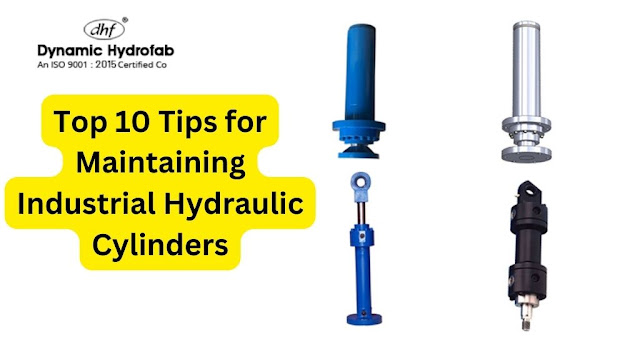Introduction
Industrial hydraulic cylinders play a crucial role in various industries, providing the necessary force and power for heavy machinery. Proper maintenance of these cylinders is essential to ensure their longevity and optimal performance. In this article, we will explore the top 10 tips for maintaining industrial hydraulic cylinders, providing you with practical guidance to keep your equipment running smoothly. Whether you're an industry professional or a curious enthusiast, these tips will help you extend the lifespan of your hydraulic cylinders and avoid costly repairs.
Here is the 10 Tips for Maintaining Industrial Hydraulic Cylinders
Hydraulic cylinders are complex systems that require regular care and attention. By following these top 10 tips, you can ensure the longevity and efficiency of your industrial hydraulic cylinders:
1. Regular Inspection is Key
Regular inspection of your hydraulic cylinders is crucial to identify any signs of wear, leaks, or damage. Inspect the cylinders for dents, scratches, or bent rods, and check the seals for any signs of deterioration. By catching these issues early on, you can prevent further damage and address them promptly.
2. Keep the Cylinder Clean
Maintaining cleanliness is essential for hydraulic cylinders. Regularly clean the exterior of the cylinder using a mild detergent and a soft cloth. Ensure that no debris or contaminants accumulate on the surface, as they can cause damage to the cylinder and affect its performance.
3. Monitor Fluid Levels
The hydraulic fluid is the lifeblood of your cylinders. Regularly monitor the fluid levels and ensure they are within the recommended range. Low fluid levels can lead to inadequate lubrication, while excessive levels can cause pressure buildup. Refer to the manufacturer's guidelines for the correct fluid type and level.
4. Change Hydraulic Fluid Regularly
Over time, hydraulic fluid can become contaminated with dirt, moisture, and debris. Regularly change the hydraulic fluid to maintain optimal performance. Follow the manufacturer's recommendations regarding the frequency of fluid changes and use high-quality fluid to ensure the best results.
5. Check and Replace Seals
Seals are crucial components that prevent leaks and maintain the integrity of hydraulic cylinders. Inspect the seals regularly and replace any damaged or worn-out ones. Properly functioning seals ensure the efficiency and reliability of your hydraulic system.
Also Read:- Hydraulic Power Pack
5 Important Hydraulic Cylinder Rebuild Tips
Top Hydraulic Cylinder Manufacturers: How to Choose the Right Partner for Your Business
6. Lubricate Moving Parts
Effective lubrication is vital for the smooth operation of hydraulic cylinders. Apply lubricant to the moving parts regularly to reduce friction and wear. Follow the manufacturer's recommendations regarding the type and frequency of lubrication to optimize performance and prevent premature failure.
7. Monitor Operating Temperatures
Hydraulic cylinders can generate significant heat during operation. Monitor the operating temperatures to ensure they remain within the recommended range. Excessive heat can lead to fluid degradation and affect the performance of the cylinders. Consider installing temperature sensors to facilitate monitoring.
8. Prevent Contamination
Contamination is a common cause of hydraulic cylinder failure. Take preventive measures to minimize the risk of contamination. Use appropriate filters and ensure that all connections and fittings are clean and tight. Regularly inspect the system for any signs of contamination and address them promptly.
9. Train Operators on Proper Usage
Proper operation of hydraulic cylinders is crucial for their longevity. Train all operators on the correct usage, emphasizing safe practices and avoiding unnecessary stress on the cylinders. Educate them about the importance of regular maintenance and encourage reporting of any abnormalities or issues.
10. Schedule Professional Maintenance
While regular inspections and maintenance can go a long way, it's essential to schedule professional maintenance for your hydraulic cylinders. Engage the services of qualified technicians who specialize in hydraulic systems to conduct thorough inspections, repairs, and maintenance tasks. Their expertise will ensure that your cylinders receive the necessary care and attention they deserve.
Conclusion
Maintaining industrial hydraulic cylinders is vital for their longevity and optimal performance. By following the top 10 tips mentioned in this article, you can ensure that your hydraulic cylinders operate smoothly and reliably. Regular inspections, proper lubrication, fluid monitoring, and professional maintenance are key aspects of effective hydraulic cylinder maintenance. Remember to adhere to safety precautions and seek professional assistance when needed. With these tips in mind, you can maximize the lifespan of your hydraulic cylinders and avoid costly downtime.
Frequently Asked Questions (FAQs)
How often should hydraulic cylinders be inspected?
Hydraulic cylinders should be inspected regularly, ideally every three to six months, depending on the operating conditions and usage intensity. More frequent inspections may be necessary in harsh or demanding environments.
Can I use any type of hydraulic fluid for my cylinders?
No, it is essential to use the hydraulic fluid recommended by the manufacturer. Different cylinders have specific requirements, and using the wrong type of fluid can lead to performance issues and damage.
What are the common signs of hydraulic cylinder failure?
Common signs of hydraulic cylinder failure include leaks, reduced performance, erratic movements, unusual noises, and increased operating temperatures. If you notice any of these signs, it's crucial to address them promptly.
Are there any safety precautions when working with hydraulic cylinders?
Yes, working with hydraulic cylinders requires adherence to strict safety precautions. Ensure proper training for operators, follow lockout/tagout procedures, and use appropriate personal protective equipment (PPE) when necessary.
How can I extend the lifespan of my hydraulic cylinders?
Regular maintenance, proper lubrication, monitoring fluid levels, and addressing issues promptly are key factors in extending the lifespan of hydraulic cylinders. Following the top 10 tips mentioned in this article will help you achieve that goal.
Can I repair hydraulic cylinders myself?
While minor maintenance tasks can be performed by experienced individuals, it is generally recommended to rely on professional technicians for hydraulic cylinder repairs. They have the necessary expertise and tools to ensure the job is done safely and effectively.
Also Read:- 7 Things to Consider Before Buying a Hydraulic Cylinder







0 comments: